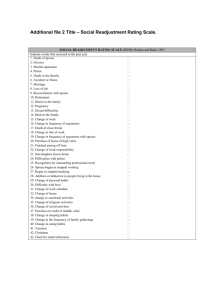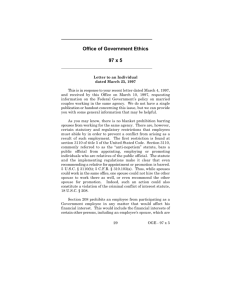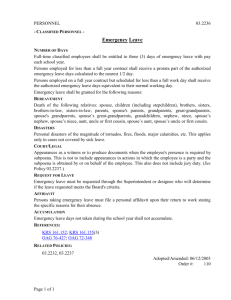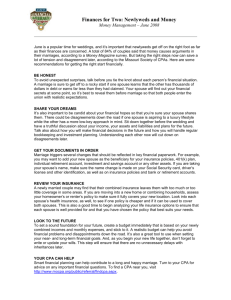the evolving Definition of “SpouSe”
advertisement
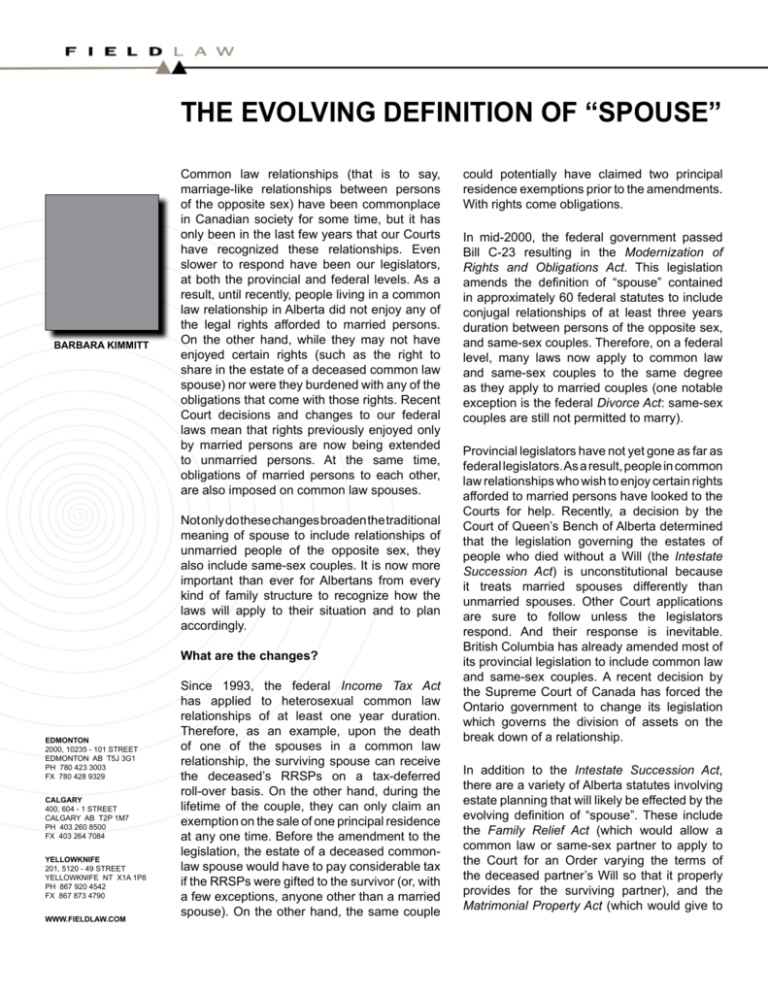
The Evolving Definition of “Spouse” Barbara Kimmitt Common law relationships (that is to say, marriage-like relationships between persons of the opposite sex) have been commonplace in Canadian society for some time, but it has only been in the last few years that our Courts have recognized these relationships. Even slower to respond have been our legislators, at both the provincial and federal levels. As a result, until recently, people living in a common law relationship in Alberta did not enjoy any of the legal rights afforded to married persons. On the other hand, while they may not have enjoyed certain rights (such as the right to share in the estate of a deceased common law spouse) nor were they burdened with any of the obligations that come with those rights. Recent Court decisions and changes to our federal laws mean that rights previously enjoyed only by married persons are now being extended to unmarried persons. At the same time, obligations of married persons to each other, are also imposed on common law spouses. Not only do these changes broaden the traditional meaning of spouse to include relationships of unmarried people of the opposite sex, they also include same-sex couples. It is now more important than ever for Albertans from every kind of family structure to recognize how the laws will apply to their situation and to plan accordingly. What are the changes? Edmonton 2000, 10235 - 101 Street Edmonton AB T5J 3G1 PH 780 423 3003 FX 780 428 9329 Calgary 400, 604 - 1 Street Calgary ab T2P 1M7 PH 403 260 8500 FX 403 264 7084 Yellowknife 201, 5120 - 49 Street Yellowknife NT X1A 1P8 PH 867 920 4542 FX 867 873 4790 www.fieldlaw.com Since 1993, the federal Income Tax Act has applied to heterosexual common law relationships of at least one year duration. Therefore, as an example, upon the death of one of the spouses in a common law relationship, the surviving spouse can receive the deceased’s RRSPs on a tax-deferred roll-over basis. On the other hand, during the lifetime of the couple, they can only claim an exemption on the sale of one principal residence at any one time. Before the amendment to the legislation, the estate of a deceased commonlaw spouse would have to pay considerable tax if the RRSPs were gifted to the survivor (or, with a few exceptions, anyone other than a married spouse). On the other hand, the same couple could potentially have claimed two principal residence exemptions prior to the amendments. With rights come obligations. In mid-2000, the federal government passed Bill C-23 resulting in the Modernization of Rights and Obligations Act. This legislation amends the definition of “spouse” contained in approximately 60 federal statutes to include conjugal relationships of at least three years duration between persons of the opposite sex, and same-sex couples. Therefore, on a federal level, many laws now apply to common law and same-sex couples to the same degree as they apply to married couples (one notable exception is the federal Divorce Act: same-sex couples are still not permitted to marry). Provincial legislators have not yet gone as far as federal legislators. As a result, people in common law relationships who wish to enjoy certain rights afforded to married persons have looked to the Courts for help. Recently, a decision by the Court of Queen’s Bench of Alberta determined that the legislation governing the estates of people who died without a Will (the Intestate Succession Act) is unconstitutional because it treats married spouses differently than unmarried spouses. Other Court applications are sure to follow unless the legislators respond. And their response is inevitable. British Columbia has already amended most of its provincial legislation to include common law and same-sex couples. A recent decision by the Supreme Court of Canada has forced the Ontario government to change its legislation which governs the division of assets on the break down of a relationship. In addition to the Intestate Succession Act, there are a variety of Alberta statutes involving estate planning that will likely be effected by the evolving definition of “spouse”. These include the Family Relief Act (which would allow a common law or same-sex partner to apply to the Court for an Order varying the terms of the deceased partner’s Will so that it properly provides for the surviving partner), and the Matrimonial Property Act (which would give to 1 The Evolving Definition of Spouse a common law or same-sex partner certain property rights over the other partner’s assets.) As a result, it is essential that people in any relationship of some permanence take some time to actively plan for the future division or distribution of assets. How does this effect the entrepreneur? All people, whether entrepreneurs or not, should realize that the changes, or impending changes, to the definition of “spouse” mean they should consider whether some succession planning is in order. This is especially the case if you are in a common law or same-sex relationship. Until now, you may have felt quite comfortable with the knowledge that unless you specify otherwise, your common law spouse is not legally entitled to any share of your estate, including your business interest. With the anticipated changes to the law, some of the possible effects would be as follows: • If you die without a Will, your common law spouse could be entitled to the first $40,000 of your estate, and the balance would be shared between your common law spouse and your children if you have any. If your estate consists of a business interest, your common law spouse could be entitled to all or some of that asset, depending on the value. • If you leave a Will which does not include your common law spouse (or leaves him or her only part of your estate), on your death, your common law spouse could make an application in Court against your estate for a share (or a larger share) of your estate. • If your common law relationship breaks down, your common law spouse could claim an interest in your property. Even if you are not in a common law relationship, you should consider whether any of your business partners, or family members are in a common law relationship. For example, if the other 50% shareholder ofyour small business has a common law spouse, you may have previously thought that a unanimous shareholders agreement was unnecessary. Now, you may want to ensure that on death, shares cannot be transferred to that spouse, but instead can be repurchased by you or the corporation. Similarly, if your children have common law spouses, and you want to ensure that any inheritance you leave to your children does not pass to that spouse, you may want to consider establishing before and after death trusts in favour of your children. What can be done? With the anticipated changes to the law, it is more important than ever that persons who are in common law or samesex relationships have a Will (and they should also have an Enduring Power of Attorney and a Personal Directive in place). If there are other dependants (such as minor children or disabled adult children from a previous relationship), you must weigh your legal and moral obligations to all parties. It would be well advised to consult with your lawyer to discuss what those obligations may be, and how they can best be met. For example, because your common law or same-sex partner may have a claim against your estate under the Family Relief Act, you may want to consider purchasing some life insurance and designating your children as the beneficiaries. When you designate a beneficiary, the proceeds do not form part of your estate and therefore would not be available to your spouse as part of that claim. Alternatively, you may want to transfer assets to a trust intended to benefit persons other than your spouse. Establishing a before death trust requires the involvement of your lawyer and your tax advisor. As a final suggestion, you should also consider having a cohabitation agreement in place to govern how your assets are to be divided in the event the relationship breaks down. Such an agreement could also address whether or not support is to be paid by one party to the other, and whether or not the parties would have a claim under the Family Relief Act against the estate of the other in the event of death. Although people are not bound by a waiver of their rights under the Family Relief Act, an agreement indicating the parties, intentions would be relevant in determining whether a claim under that legislation is successful. In any case, the constantly changing definition of “spouse” means that people in all varieties of permanent relationships need to address the fact that the law is evolving and they should be prepared for it. Disclaimer This article should not be interpreted as providing legal advice. Consult your legal adviser before acting on any of the information contained in it. Questions, comments, suggestions and address updates are most appreciated and should be directed to: Edmonton 780-423-3003 Calgary 403-260-8500 REPRINTS Our policy is that readers may reprint an article or articles on the condition that credit is given to the author and the firm. Please advise us, by telephone or e-mail, of your intention to do so. 2



